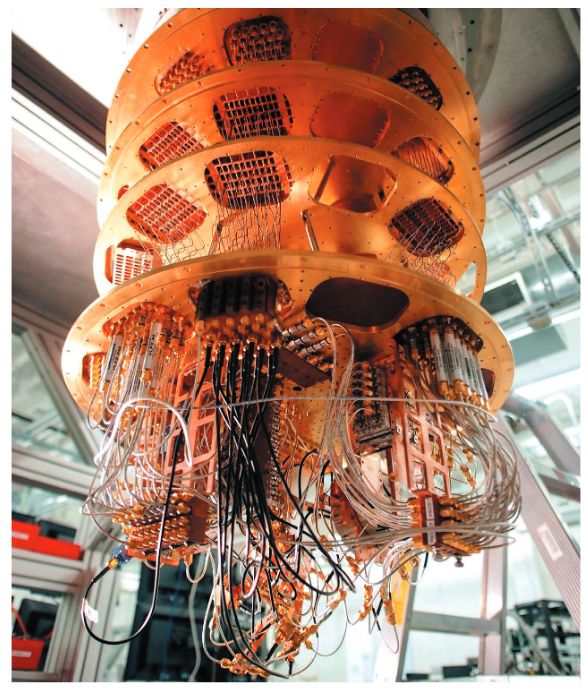
Quantum computing
Quantum computing is a fast-growing field of computer research with commercial applications expected in the near future. By this time, quantum computers will surpass traditional computers in certain tasks, which include molecular and material modeling, logistics optimization, financial modeling, cryptography, and artificial intelligence training.
Fundamentals of Quantum Computing
Traditional computers are built from silicon chips containing millions or billions of miniature transistors. Each of them can be turned on - in the understanding of the machine, this is a state "0" or "1". Subsequently, the computer stores and processes the data using " binary numbers " or " bits ".
Quantum computers work with "quantum bits" or " qubits ." They can be supported in hardware in different ways - for example, using the quantum mechanical properties of superconducting electrical circuits or individual trapped ions.
Qubits can exist in more than one state or " superposition"At the same time. This allows a qubit to take the value "1", "0", or both at the same time. This allows a quantum computer to process much more data than a classical computer and to perform massively parallel processing. It also means that every qubit added to a quantum computer exponentially increases its power.
Most people get lost when they hear about the properties of a qubit. A flipped coin cannot come up heads and tails at the same time. And yet, the quantum state of a qubit can do something similar. Therefore, it is not surprising that the famous nuclear physicist Niels Bohr once said: "Anyone who is not shocked by quantum theory simply does not understand it!"
Besides superpositions, qubits can get entangled. " Entanglement”Is another key quantum mechanical property, which means that the state of one qubit can depend on the state of another. This means that observing one qubit can reveal the state of its unobservable pair.
It is very difficult to create and manage qubits. Many of today's experimental quantum processors use quantum phenomena that occur in superconducting materials and therefore need to be cooled to near absolute zero (about minus 272 degrees Celsius). Protection from background noise is also required, and even then, performing calculations using qubits will require error correction. The main goal of quantum computing is to create a fault-tolerant machine.
Quantum pioneers
Companies currently developing hardware for quantum computers include: IBM, Alibaba, Microsoft, Google, Intel, D-Wave Systems, Quantum Circuits, IonQ, Honeywell, Xanadu, and Rigetti. Many of them work in conjunction with research groups at major universities, and they all continue to make significant progress. The following is an overview of the work of each of these companies.
IBM
IBM has been working on a quantum computer for over 35 years. She has made significant progress with several machines working. According to the IBM-Q website : “Today, quantum computing is a playground for researchers, but in five years it will become mainstream. In five years, the effect of quantum computing will go beyond the research laboratory. It will be widely used by new categories of professionals and developers who use this new method of computation to solve problems that were once considered insurmountable. "
In 2016, IBM launched a websitecalled IBM Q Experience, which showed a 5-qubit quantum computer to the entire internet. Since then, it has been joined by a second 5-qubit machine and a 16-qubit machine, both of which are available for experimentation. To help those who want to learn about and participate in quantum computing, IBM offers an open source quantum computing software platform called Qiskit .
In November 2017, IBM announced that two 20-qubit machines were being added to its quantum cloud. They can be used by customers who are registered members of the IBM Q Network... IBM describes it as "a worldwide community of leading Fortune 500 companies, startups, academic institutions and national research labs working with IBM to advance quantum computing and explore practical applications for business and science."
Also in November 2017, IBM announced that it had designed a 50-qubit quantum processor, which at the time was considered the most powerful quantum hardware.
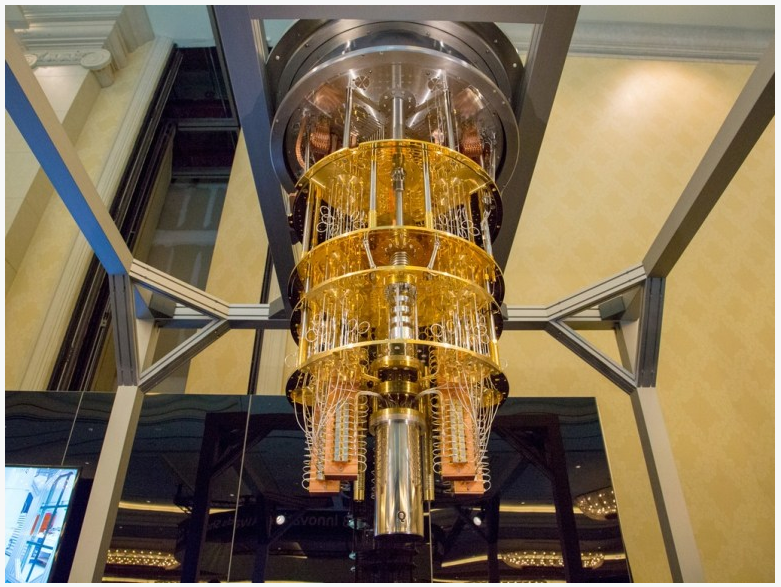
IBM's 50-qubit quantum computer
In January 2019, IBM announced its IBM Q System Oneas "the world's first integrated universal approximate quantum computing system developed for scientific and commercial use." This modular and relatively compact system is designed for use outside the laboratory. You can read more about IBM Q System One in this press release .
Another tech giant that is working hard to make quantum computing a reality is Google, which has a quantum AI lab. In March 2017, engineers Masoud Mohseni, Peter Reed and Hartmut Neven, who work at the facility, published an article in Nature . In it, they said that quantum computing is possible on relatively small devices that will appear over the next five years. This confirms IBM's vision of the timing of commercial quantum computing.
In the early days of quantum computing, Google used a machine from the Canadian company D-Wave Systems. However, the company is now actively developing its own equipment, and in March 2018 announced a new 72-qubit quantum processor calledBristlecone .
In June 2019, the director of the laboratory of quantum artificial intelligence at Google, Hartmut Neven, reported that the power of their quantum processors is currently doubling exponentially. This has been called "Nevan's Law" and suggests that we can reach the point of quantum superiority, where a quantum computer can surpass any classical computer by the end of 2019.
In October 2019, a team of Google engineers published an article in Nature, in which she claimed to have achieved quantum superiority. Specifically, Google scientists used a quantum processor called Sycamore to sample the output of a pseudo-random quantum circuit. It took Sycamore about 200 seconds to sample one instance of the schema a million times. By comparison, the Google team calculated that a classic supercomputer would take about 10,000 years to perform the same calculations. The team then concluded: “Quantum processors based on superconducting qubits can now perform computations beyond the reach of the fastest classical supercomputers available today. This experiment marks the first computation that can only be performed on a quantum processor. Thus, quantum processors have reached the quantum supremacy regime. "
This revelation by Google engineers was big news, but soon sparked controversy. IBM published a blog post saying that the calculations in the Google experiment could be done on a classic computer in two and a half days, not 10,000 years. And according to IBM: "Since the original meaning of the term 'quantum supremacy', as proposed by John Preskill in 2012, was to describe the point at which quantum computers can do what classical computers cannot - this boundary has not yet been crossed."
Alibaba
In China, the main internet giant is Alibaba , not Google. And in July 2015, they merged with the Chinese Academy of Sciences to form the "CAS Quantum Computing Laboratory - Alibaba." As explained by Professor Jianwei Pan, their goal is "to conduct cutting-edge research on systems that seem most promising for the implementation of practical applications of quantum computing, and to break the bottlenecks of Moore's Law and classical computing." You can visit the laboratory website here .
Like IBM, Alibaba has made an experimental quantum computer available online. Specifically, in March 2018, the Chinese e-business giant launched its "superconducting quantum computing cloud" to provide access to an 11-qubit quantum computer. It was developed with the Chinese Academy of Sciences and allows users to run quantum programs and download results.
Microsoft
As you might expect, Microsoft is also interested in quantum computing and is working with some of the world's top scientists and universities. To this end, Microsoft has established several Station Q labs, such as the lab at the University of California. In February 2019, the company also announced the Microsoft Quantum Network to bring all partner coalitions together.
A key element of Microsoft's strategy is to develop quantum computers based on " topological qubits”That the company believes will be less error-prone (hence, less system resources are required to fix errors). Microsoft also believes topological qubits will be easier to scale for commercial applications. According to a May 2018 article in Computer Weekly, Microsoft’s VP of Quantum Computing believes commercial quantum computers could hit their Azure cloud platform in just five years.
On the software side, in December 2017, Microsoft released a preview of its Computing Developer Tool . It is free to download and includes a programming language called Q #and a quantum computing simulator. In May 2019, Microsoft announced that it was going to open source the developer tool. And in May 2020, the company announced its Azure Quantum cloud computing service .
Intel
Intel, as the world's leading microprocessor manufacturer, is also working on chips for quantum computing. The company takes two different approaches. One of these areas is being pursued in collaboration with the leading Dutch quantum computing pioneer QuTech . On November 17, 2017, Intel announced the delivery of a 17-qubit test chip to its partner in the Netherlands. Then, in January 2018 at CES, the company announced the delivery of a 49-qubit quantum test processor called Tangle Lake .
Intel's second line of quantum computing research is entirely in-house and involves the creation of processors based on a technology called spin qubit". This is an important innovation because the spin qubit chips are manufactured using traditional Intel silicon fabrication methods. In June 2018, Intel announced that it had begun testing a 26-spin qubit chip.
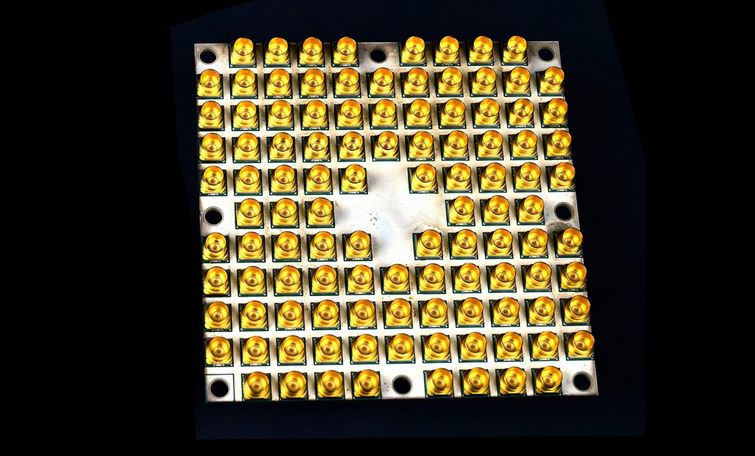
Intel spin qubits are only about 50 nanometers in diameter, or 1/1500 the width of a human hair. This means that perhaps in ten years, Intel will be able to produce tiny quantum processors containing thousands or millions of qubits. Unlike conventional processors, they need to be cooled to near absolute zero. But the potential is truly exciting. According to section Intel's quantum computing site, the company aims to produce quantum processors for ten years and expects the technology to enter its "commercial phase" around 2025.
D-Wave Systems
D-Wave Systems is a pioneer of quantum computing based in Canada and demonstrated a 16-qubit quantum computer back in 2007. In 2011, the company sold the 128-qubit D-Wave One for $ 10 million to Lockheed Martin, a US military industrial corporation. In 2013 - 512-qubit D-Wave Two to NASA and Google. By 2015, D-Wave had broken the 1,000-qubit barrier with its D-Wave 2X , and in January 2017 sold its first 2,000-qubit D-Wave 2000Q to cybersecurity firm Temporal Defense Systems.
As you read this list of accomplishments, you may have come to the conclusion that D-Wave should be the world's leading manufacturer of quantum computers. After all, this is the only company that sells such machines. However, the company's work remains controversial. This is because their equipment is based on an “adiabatic” process called “ quantum annealing, ” which other pioneers have dismissed as “restrictive” and “dead-end”. IBM, for example, is taking a "gate-based" approach to quantum computing that allows it to manipulate qubits in the same way a transistor controls the flow of electrons in a conventional microprocessor. But the D-Wave system does not have such control.
Instead, the D-Wave quantum computer takes advantage of the fact that all physical systems tend toward states of minimum energy. So, for example, if you brew a cup of tea and go away on business - when you return, it will be cold, because the contents tend to the minimum energy state. The qubits in the D-Wave system are also susceptible to this, and therefore the company uses its equipment to solve optimization problems, which can be expressed as “energy minimization problems”. This limits the possibilities, but still allows the hardware to execute certain algorithms much faster than a classic computer. You can watch the video in which D-Wave explains its approach to quantum computing.
In August 2016 in the articlePhysical Review X reported that some algorithms run up to 100 million times faster on D-Wave 2X than on a single-core classic processor. One of the authors of this study was the CTO of Google. All this suggests that the opinion about the value of D-Wave for the development of quantum computing remains controversial.
The company continues to promote its quantum computers. In October 2018, D-Wave launched a cloud-based quantum application framework called Leap . It provides real-time access to the D-Wave 2000Q quantum computer, and access was expanded in March 2019 to provide this capability to Japan and all of Europe.
Rigetti
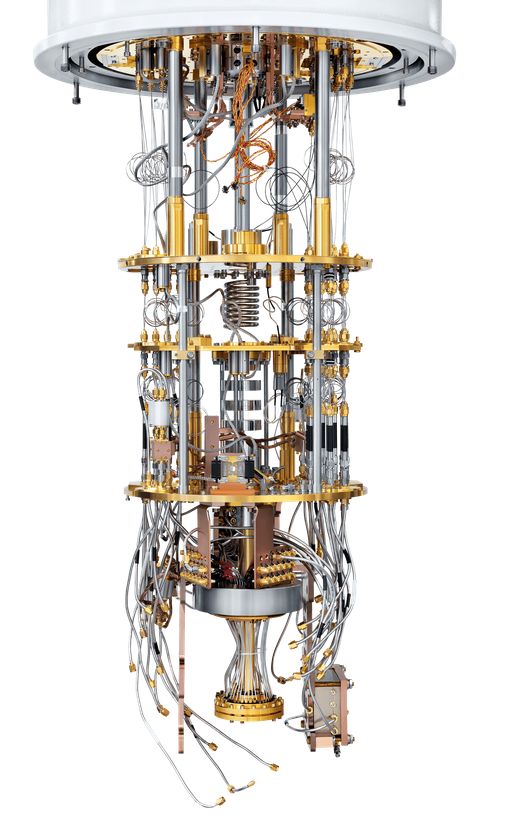
Another player in the field of quantum computing is a startup called Rigetti . The company already employs more than 120 people and has built a 19-qubit quantum computer available online through their development environment called Forest .
Quantum Circuits
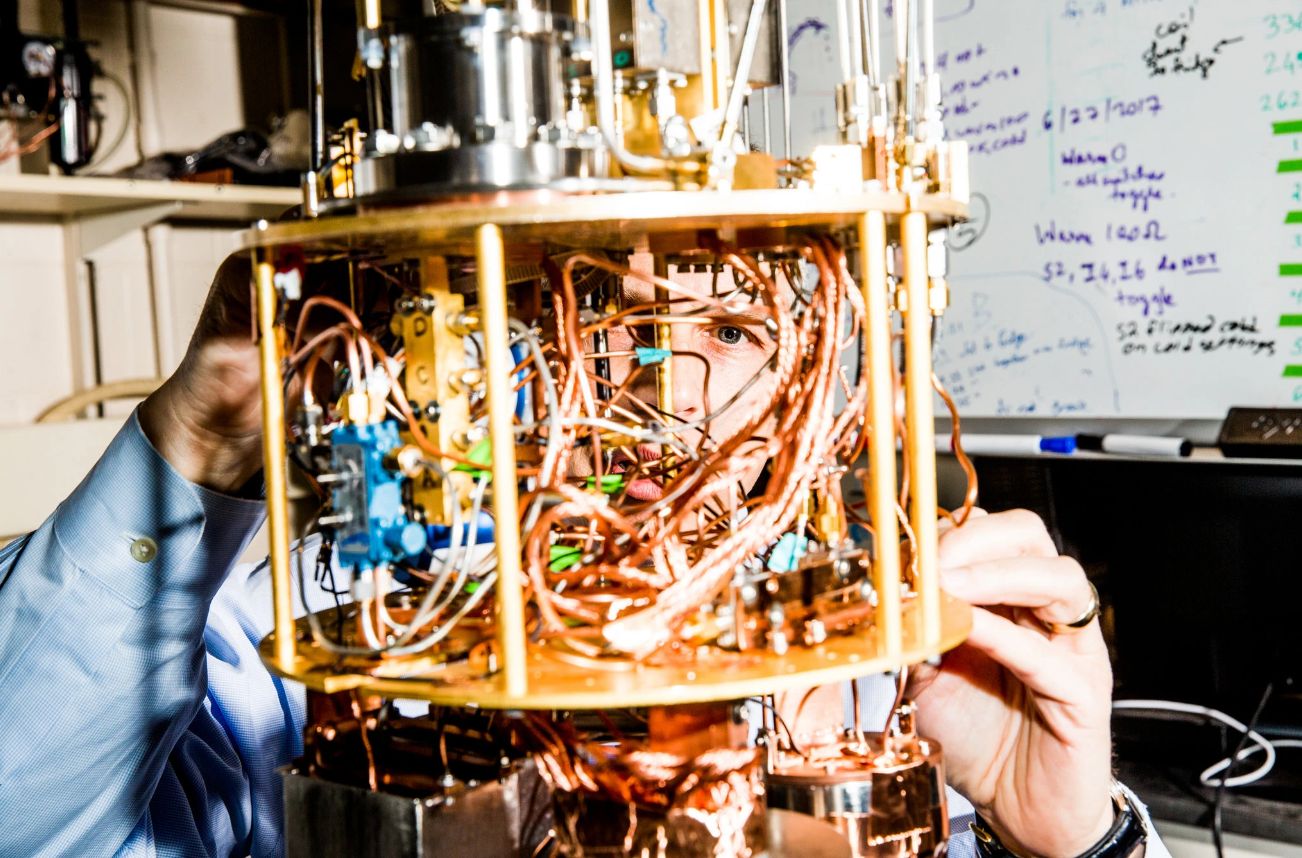
Another startup is Quantum Circuits , founded by leading professor of quantum computing, Robert Schölkopf and other colleagues at Yale University. The company has raised $ 18 million in venture capital and plans to " beat the computing giants " in the race to create a viable quantum computer.
IonQ
IonQ - Specializes in trapped ion quantum computing. The company claims that its technology "combines unrivaled physical performance, perfect qubit replication, optical connectivity, and highly optimized algorithms" to "create a quantum computer that is as scalable as it is powerful and that will support a wide variety of applications. in a variety of industries. " If you want to learn more about quantum computing, the IonQ site has a great tutorial .
Xanadu
Xanadu develops photonic quantum computing by integrating "quantum silicon photonic chips into existing hardware to create fully functional quantum computing." As the company notes, compared to other qubit technologies, “photons are very stable and are almost immune to random noise from heat. We use photonic chips to generate, control and measure photons in ways that allow extremely fast computation. ”
Honeywell
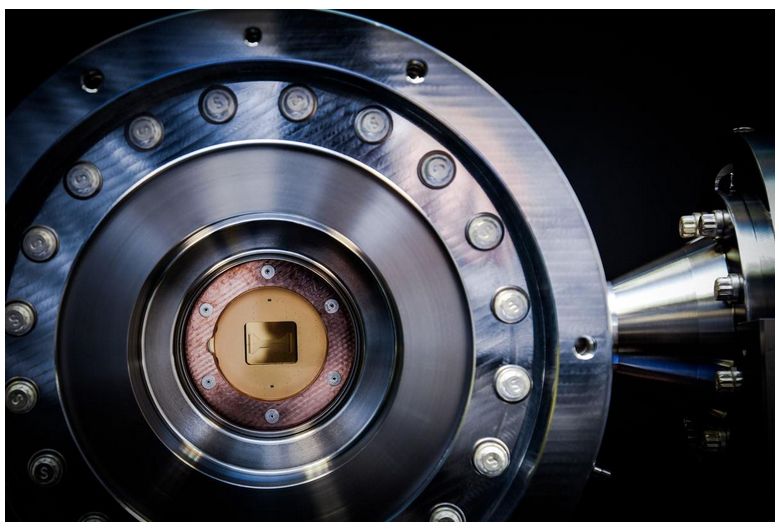
Honeywell is another company that is using trapped ion quantum computing . The company has vast experience in business computing. In June 2020, Honeywell announced the world's highest performing quantum computer. The rest of the companies were skeptical about this. But, nevertheless, this is another important development - especially since it became known that the American financial holding JPMorgan Chase is already experimenting with this system for developing financial services applications, including fraud detection and AI-controlled trading.
Amazon
Amazon hasn't announced any hardware or software development for quantum computing. However, on December 2, 2019, the giant launched a number of quantum Amazon Web Services . These include the Amazon Bracket , which allows scientists, researchers, and developers to start experimenting with quantum computers from multiple hardware vendors. Specifically, customers can access equipment from Rigetti, Ion-Q and D-Wave Systems, which means they can experiment with systems based on three different qubit technologies.
In addition to Bracket, Amazon also launched the Amazon Quantum Solutions Lab... It is designed to help companies "prepare for quantum computing" by enabling them to work with leading experts. Thus, the key thing that Amazon does with its quantum computing offerings is to act as a cloud broker. That is, to become an intermediary between manufacturers of quantum computers and those who want to use their capabilities.
Quantum computer software developers
Even the best equipped quantum computer cannot be used without the proper software, and many of the manufacturers of these machines are developing their own. Nevertheless, the number of third-party software for quantum computers is constantly growing.
1QBit
1QBit partners with large companies and "leading hardware vendors to solve industry-specific optimization, simulation and machine learning challenges." The company develops software for both classical and quantum processors.
CQC
Cambridge Quantum Computing develops quantum computing software for solving the "most intriguing problems" in fields such as quantum chemistry, quantum machine learning and quantum cybersecurity. Clients include companies from “some of the world's largest chemical, energy, financial and materials science organizations” that are trying to harness the power of quantum computing.
QC Ware
QC Ware develops "enterprise quantum computing software and services" with clients including Airbus, BMW and Goldman Sachs, and hardware partners including AWS, D-Wave Systems, Google, IBM, Microsoft, and Rigetti.
QSimulate
QSimulate develops software to "harness the power of quantitative modeling to solve pressing pharmaceutical and chemical problems."
Rahko
Rahko creates software that is designed to use quantum machine learning (quantum AI) to solve quantum chemistry problems.
Zapata
Zapata works with its clients to develop quantum computer software for solving complex computing problems in fields such as chemistry, finance, logistics, pharmaceuticals, mechanical engineering and materials.
Applications for quantum computers include molecular modeling (also known as quantum chemistry), logistics optimization, financial modeling, cryptography, and artificial intelligence training. Some large enterprises are already actively exploring what exactly quantum machines can do for their research and development, products and services, and their bottom line. I'll give you some examples.
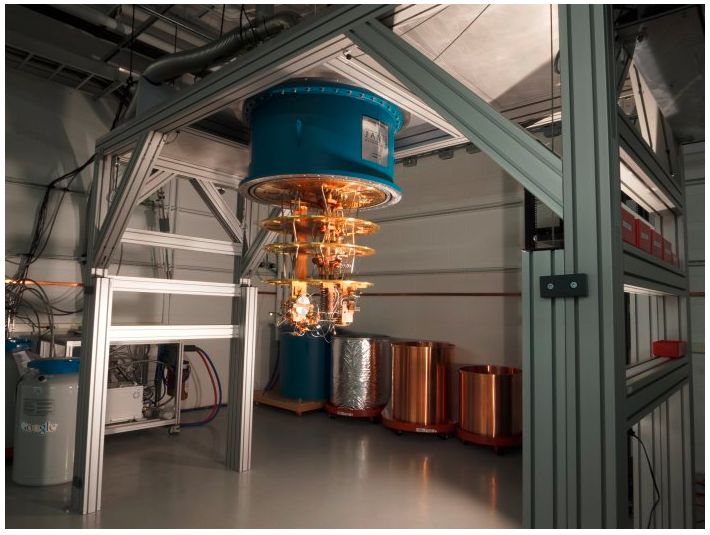
Daimler is working with both IBM and Google to investigate how quantum computers can be used in logistics to optimize vehicle delivery routes or parts flow through factories. The company is also exploring how quantum computers can be used to model the chemical structures and reactions inside batteries to help improve electric vehicles.
Another automotive giant, Volkswagen, is working with Google and D-Wave Systems to apply quantum computers to solving traffic optimization problems and developing better batteries.
In the financial sector, JPMorgan is working with IBM to study how quantum computers can help design trading strategies, portfolio optimization, asset pricing, and risk analysis. Another financial conglomerate, Barclays, is participating in the IBM Q Network to see if quantum computers can be used to optimize the settlement of large batches of financial transactions.
In 2011, aerospace giant Lockheed Martinbecame the first purchaser of a quantum computer manufactured by D-Wave Systems and has continued to explore the possibility of using this technology for applications including air traffic control and system verification. Airbus is similarly exploring how quantum computers can accelerate its research activities and has invested in QC Ware, a software company for quantum machines.
Meanwhile Accenture Labs and biotech company Biogenare collaborating with 1QBit to explore how drug discovery can be accelerated by using quantum computers for molecular comparisons. In September 2017, IBM used its 7-qubit hardware to model the structure of a triatomic beryllium hydride molecule. In October 2017, Google and Rigetti also announced OpenFermion , a program for simulating chemical processes on a quantum computer.
Quantum future
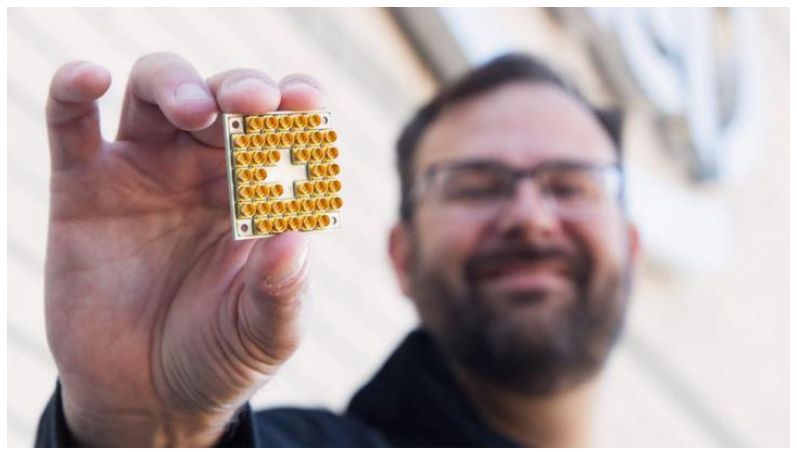
I hope this article has shown you how quantum computing goes from fantasy to reality pretty quickly. It is reasonable to assume that in the 1920s, quantum supercomputers will be available from the cloud, which will find practical applications at a low cost. It's possible that in a decade the mainstream internet search and cloud AI services will exploit the power of quantum machines without most users realizing it.
For those looking to find out more, here are a few selected sources for more information:
- Kevin Hartnett, The Dawn of Quantum Computing , Quanta Magazine, June 18, 2019
- Masoud Mohseni 2017 article "Commercialization of early quantum technologies"
- Article by John Preskill "Quantum Computing in the NISQ Era and Beyond" from 2018
- IonQ Technology website
- D-Wave Systems Video Explaining Quantum Annealing
- IBM-Q website
- Microsoft Quantum Computing Site
- Google Quantum AI website
- Intel Quantum Computing News Blog
- D-Wave Systems website
- Quantum Circuits website
- HQS Quantum Simulations website
In the book " Digital Genesis " by Christopher Barnatt, author of this article and explainingcomputers.com, you can read about quantum computing and much more related to future computing developments, such as organic computers.
